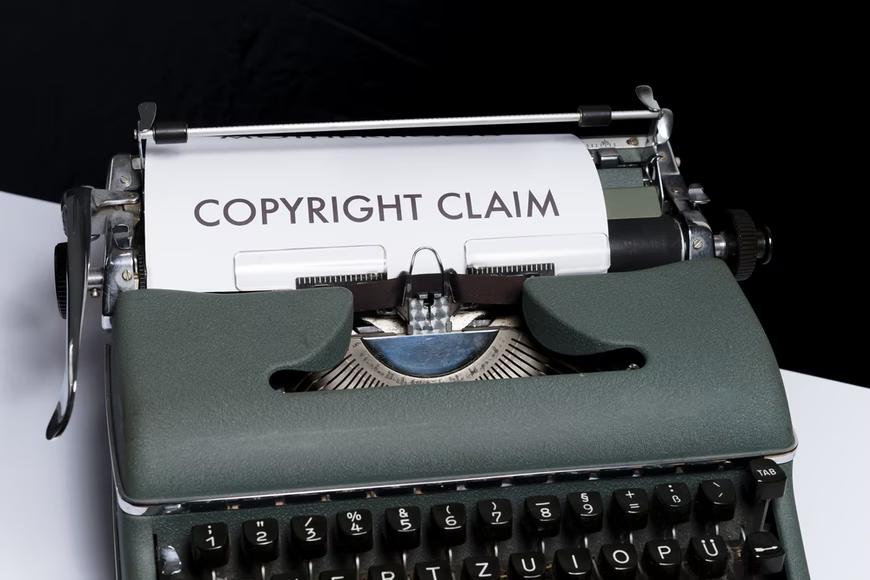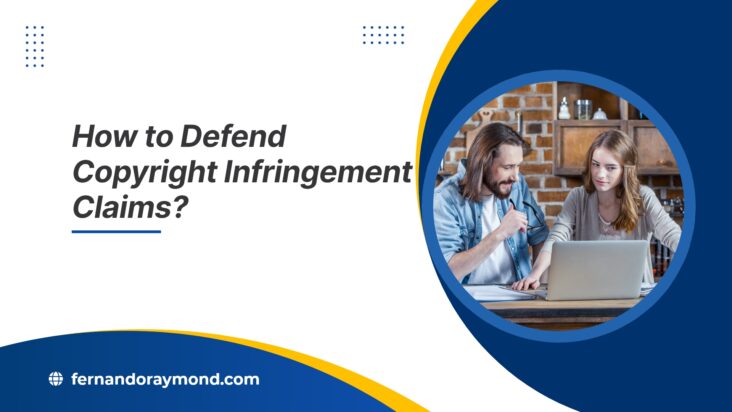As an internet entrepreneur I have come across various copyright infringement claims targeting the websites that are registered with my companies.
So many people are looking for help on the web for defenses to copyright infringement claims and want to know what they can do. After a lot of research and discussion with Manuela Willbold and legal advisors I have published this guide on how to manage Copyright Infringement claim letters or claims for money.
The purpose of this guide is to inform online users, bloggers, and webmasters about my business experience with copyright law and copyright infringement claims.

And I have noticed that more copyright infringement scams are circulating as I have received some myself or have been informed by other webmasters that they have received such.
Due to the high volumes of online content available on the internet, there’s a lot more uncertainty about the copyright of digital content and how and for what copyright infringement may become an issue.
As the CEO of a web hosting company and a digital marketing agency I work with many bloggers, marketers, webmasters and writers and I want to offer my support based on my own experiences and lessons with regards to copyright infringement claims. Many of you may face such if you knowingly or unknowingly use copyright-protected material without getting permission from the copyright owner, but there are also various elements you need to consider when you’re faced with such claims.
Someone can accuse anyone of having used their copyright-protected content on the internet and it is then down to the accused to prove their innocence. This can be difficult, if you’re not familiar with the ins and outs of copyright law and the rights and responsibilities you have in the case of a copyright infringement claim made against you.
I want to help all digital and internet entrepreneurs that manage websites and content by sharing the information I have gathered through legal consultations and my own research. Here are the key findings:
- Analyse a copyright infringement claim and establish whether it’s justified and authentic.
- Manage the communication with the copyright infringement claimant effectively.
- Find the best solution for the claim to be solved while trying to reduce the cost.
So, read on if you have been involved in a copyright claim or you are concerned about copyright issues with your website content and you want to protect yourself and your business legally.
UK Copyright Law – what you should know

The applicable UK copyright law can be found here: The Copyright, Designs and Patents Act 1988.
This copyright act gives creators of musical, dramatic, and artistic works the right to take control of the ways in which their materials can be used.
The rights protect copyright owners from their works being:
-
- copied
- issued & lent to the public
- adapted
- broadcast & publicly performed
Over the years I have received copyright infringement claims from photographers and agencies where they send a notice via email and post showing that they are the owners of the licensed images with the price for the license that they have found on the website in question.
However, the difficulty nowadays is that these images are indexed on search engines, unless the copyright owner deindexes them. As an SEO consultant I know that the more the images are indexed and populated on various platforms, the better the exposure of the material. This makes it more difficult for the accused to validate the authenticity of such a claim, because when people find such images on search engines, the license will not appear here.
Search engines advise users that the images may be copyright protected. If the images on search engines lead back to the original owner’s website, the user will then be able to discover there that the images are copyright protected and licensed and that they must pay the license and ask for permission from the owner to use them.
If the indexed image on search engines does not lead back to the original copyright owner’s website as is the case often, if the image has been published by multiple websites, it would be much more difficult for the accused to identify whether the images are licensed, or copyright protected as per the claim.
Also, often people publish copies or screenshots, which are then indexed and lead to different internet sources and websites.
That’s where in my view a copyright infringement claim must be carefully reviewed to ensure that it is legally sound.
Whenever I receive a copyright infringement claim I first check whether it is a copyright infringement scam, which can be extremely difficult.
I research the claimant on the web to understand their background better. In most cases the copyright license claimed can only be found on their own website, which makes it very one-sided in my view as one cannot get this information from an independent source.
My questions to any copyright owner making copyright infringement claims therefore are:
-
how do you ensure that the content you claim copyright for is legitimately and authentically licensed by you?
-
what do you base your license fee on for transparency?
-
how are you protecting this content online from being used without your permission?
Copyright owners can make license fee payment claims and even take the targeted copyright defendants to court by making a money claim without necessarily having to provide thorough evidence that they are making the claim against the right person or organisation (the evidence they provide is usually based on screenshots and URL references, which technically do not provide proof of the ownership of a domain for example).
This can be confusing and frustrating for the defendant, and they then need to provide evidence that the claimant has made the claim against the wrong person or organisation.
Additional confusion may arise when the claim letter is addressed to your company but emailed to a different email address that they connect with your business. You may be suspicious when receiving such correspondence, however, if the copyright owner puts the claim forward in court, it will be pursued.
It is extremely difficult to identify whether a copyright claim is legally justified or a scam hence why many, including myself, will be confronted with the law, which is also why I want to share this experience with my readers and followers to create more awareness.
So, my dear entrepreneurs and webmasters, be prepared for such cases and inform yourselves about the applicable law and responsibilities to manage such legal claims against your business or yourself effectively to ensure you won’t suffer severe damages.
I recommend you ask these Questions when you receive an alleged Copyright Infringement Claim:

If you receive an email or letter making a copyright infringement claim against you, it is important to establish the legitimacy and authenticity of the claim and the claimant.
I was unable to find general guidelines about how copyright licensing fees are calculated, so it appears that every copyright owner can individually establish these. This makes it harder for the defendant to figure out whether a licencing fee is justified, fair and authentic.
As it stands a copyright owner can inform you about the price they charge for the use of their content, which would likely be shown on their website, or some use a license fee calculator or contract which they will share with you.
We therefore always check the following before we respond to any copyright infringement claim:
-
Is the claim coming from the original copyright owner? – Only they alone can make a claim against you for copyright infringement so in case of an agency, they need to prove that they are the copyright owner.
-
Does their claim present sufficient and authentic evidence that copyright infringement has occurred? – Because it is the responsibility of the copyright owner to prove who has committed the infringement and how. We found a sample copyright notice here to check what should be covered in it.
-
Is the calculation of the fee they demand to be paid for the infringement substantiated, e.g., are the fees publicly available for transparency/are they reasonable? – Even if the alleged infringement is confirmed, there’s no obligation to accept the settlement sum proposed by the copyright owner if there is a possibility that it’s disproportionate to the alleged infringement (source).
-
Does the copyright owner repeat demands for money and threaten or pressurise you? – If this happens reporting them to Trading Standards is an option.
-
Is the copyright owner, exclusive licensee, solicitor, or agent pressurising you to pay them money for the alleged infringement? – Then they may be taking part in unfair commercial practices or aggressive practices. These include misleading or harassing you to try and make you pay compensation when you don’t need to (source).
How to Avoid or Deal with Copyright Infringement Claims effectively
The main problem with copyright law in my view is that it does not clearly define how a copyright owner should ensure that their content is visibly protected by copyright, especially on the internet. And that any amount can be claimed, and a defendant will not be able to find neutral or unbiased sources to establish whether the charged amounts are reasonable and justified.
The current copyright law does also not encourage copyright owners to make use of the various tools available to protect their content online as automatically everyone should just assume that content online is copyright protected.
Google for example offers a copyright infringement report form and so does YouTube: Overview of copyright management tools – YouTube Help (google.com).
So, if a copyright owner has not taken all necessary steps to clearly inform the public about the copyright license of their content or to make it as transparent as possible to hinder people from using their protected content, do they still have a right to make a claim? – Yes!
IP lawyers such as Harper James Solicitors offer their advice online with regards to copyright infringement:
I personally think that anyone who wants to protect their work online should create and add a copyright disclaimer to make it clear to all viewers that this content is protected by a copyright license (there are also tools that can disable the copy/paste option of content on a website).
For the best transparency a copyright owner could include the following elements to their protected content:
- A signifier/symbol that makes it clear that it’s a copyright notice
- Their name as the copyright owner/author
- The year the work was published
- A declaration claiming their rights over the work
Check out copyright disclaimer examples here also for your own content.
They can also maintain an IP & Copyright Policy for their business accessible on their website and if any copyright owner trying to make copyright claims did this, it would improve transparency.
Even if you use online content and adequately attribute or reference the source, copyright owners will claim that this is not sufficient and demand to pay their licensing fees. This puts the defendants in a very vulnerable position, and it appears to me that currently the law protects copyright claimants more than copyright defendants.
Learn more about copyright for digital images and photographs here to fully understand the scale of using copyright protected internet content to protect yourself.
If the content is attributed to an agency such as Getty Images, then you may have to pay to use it as most agency’s content is licensed.
Using stock photos that offer commercial licenses for free use of the downloadable material and adding the image sources is usually the safest bet to avoid copyright infringement. However, such images do not always work for certain websites such as blogs that cover news for example. If you want to use images of public personalities such as politicians or celebrities, you need to ensure that the sources provide you with a licence allowing you to use them in the way you intend to.
Currently, social media posts can be embedded with a full source reference as they are clickable in a post and lead the reader directly to the source account, which is publicly accessible, but this might change.
For your own images, provide credits of the source/photographer. You can find free images on many stock photo websites and online photo editor tools and we recommend to create your own images where possible or making them unique by editing them individually, if they’re not copyright protected.
Because for the purposes of SEO and branding, you want to provide your readers with helpful and insightful content that they cannot find anywhere else so that they always come back to your website for more.
My Experience with Copyright Infringement Claims from Agencies
There are also several copyright infringement agencies like CopyTrack, ImageRights & Pixsy, and PicRights Ltd. around.
With such agencies it is trickier to identify whether a copyright infringement claim is legitimate as they often claim to act in the name of the original copyright owner and they will provide evidence such as a letter signed by the copyright owner. But it would be extremely difficult for any defendant to establish whether such documents or letters are authentic or not.
Copyright Infringement Agencies act as active enforcers of copyright protected images. They send emails to those who have in their eyes unlawfully used the copyright-protected works of their clients, whom according to them include Reuters for example.
You may initially receive a letter with the copyright infringement claim and an email to the business or webmaster contact they identify online. The agencies usually include screenshots of their client’s original work and where they found it on your website, and ask the person to pay for the license, which they calculate with their internal license calculator. They may provide an online login for the defendant to check their claim and pay with a credit or debit card.
When I received such correspondence, I first checked the authenticity of the agency and their claim. Doing some background checks about the agency and consulting with organisations like Citizens Advice, the IPO, the Federation Against Copyright Theft and Get Safe Online before you make any payments can be helpful. It is vital to confirm the legitimacy of the copyright claim. For this, you can also consult a solicitor and usually they offer an initial consultation for free.
When researching such agencies, I came across many reports of their practices in forums where people share their experiences with them. Their tactics are often described as intimidating and many report that their concerns about the claim were not taken into consideration.
You can read this government article about what to do when you receive such a letter to better understand your rights and responsibilities.
If you feel that the agency has not dealt with you in a fair manner, you should file a complaint to them. If this doesn’t lead to a result after 8 weeks, then you can file a complaint against them with the ICO.
You can also report scam or phishing emails that contain links to payment portals, asking you to add personal or payment details to the Action Fraud Police and they will investigate these.
In our correspondence with such agencies we were doubtful about the legitimacy of their claims and demanded more evidence. So far, we haven’t been provided with this.
My Verdict
Copyright law can be an overwhelming minefield that can lead to serious legal disputes with potentially high cost, especially if courts are involved. Educate yourself about copyright infringement, the laws, and your rights and responsibilities to manage it effectively as an entrepreneur or webmaster.
Copyright scams are difficult to identify as per my observation and I want to support all webmasters and businesses that may become victims of such activity. I cannot offer you legal advice, but I can share my knowledge and experience from the copyright infringement claims I have been exposed to.
Feel free to get in touch with me, if you are concerned about your website content or have questions with regards to it. Together we can find solutions to make the web a better and fairer place for all webmasters, bloggers, and internet entrepreneurs as well as copyright owners.








GIPHY App Key not set. Please check settings